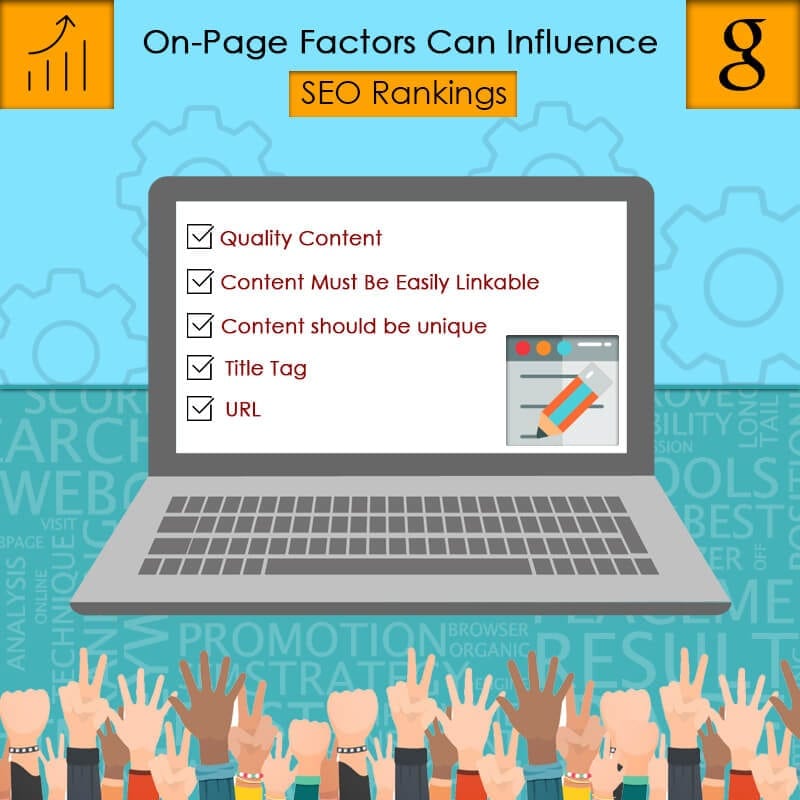 If you’ve been maintaining a website for some years, you may be aware that there are some distinct on-page SEO aspects or factors associated with a specific webpage that can influence the portal’s ranking on Google’s SERPs. And what are these on-page optimization aspects? Following are some of the most influential on-page factors having an impact on your site’s ranking.
If you’ve been maintaining a website for some years, you may be aware that there are some distinct on-page SEO aspects or factors associated with a specific webpage that can influence the portal’s ranking on Google’s SERPs. And what are these on-page optimization aspects? Following are some of the most influential on-page factors having an impact on your site’s ranking.
- Page Content
After fulfilling all the parameters or standards of Google’s site indexation specifics, it is what goes into each of the webpage of your site that matters the most. This is so because users who have logged into your site have done so with the expectation that they might come across the relevant data about the product or service you’re promoting or info regarding some specific topic or subject-matter. Therefore the significance of developing appropriate content that is original (free from duplication and have passed copyscape checks) cannot be underestimated, as far as SEO is concerned.
And how’d you define quality or rich content? Original content, regardless of whatever the product, service or subject-matter the text is elucidating has to meet the demand-supply yardsticks on one hand, and must be link-friendly or quickly linkable, on the other. Satisfying these two criterions is indispensable from the SEO standpoint. Let’s discuss these two important attributes a little more in detail.
Quality Content Satisfies Demand for a Specific Product or Service
Comprehending what good content implies would be easier if the same is viewed from perspective of global trade and commerce. Commercial trade throughout the world always has been dictated and continues to be influenced by the two primary economic forces-demand and supply. Let’s suppose, you deal in products and accessories related to game fishing including fishing rod, spool, lures, baits, and so on.
Obviously, textual content, graphics, and footages uploaded on your site should be lucid and expressive enough so that the same can guide anglers and fishers on choosing the products that can serve their needs. Or if you’re running an institute that imparts training and guidance on software courses, then the content should clearly define what the courses or programs are about, how the same will enrich learners, and whether the trainees will be able to find employment after imbibing a course. To put in short, content, regardless of the form it is in (textual, imagery or videos), must supply or cater to the specific demand for which the same has been created.
Content Must Be Conveniently and Easily Linkable
Google will tend to ignore your website when or whenever the search engine goes on a SEO drive if it has trouble linking or connecting to the portal’s content. The richness and originality of the content will simply not make any difference or have an impact on the SEO landscape, if search engines encounter issues while attempting to link to it for the purpose of indexation/ranking. If your site is not supremely linkable, users will not be able to access, share or reproduce content as smoothly as they’d wish to. And how’d you make your site more link-friendly? See to it that the site fulfills the following requirements or specifics:-
- Content should be unique, original, and easily comprehensible
- Site should be user-friendly which implies that the same should be navigable, the web pages should load fast, and should be accessible on multiple browsers
- Content should be reinforced with SEO keywords
- URL should clearly indicate the topic of the page
- Profile and content should be optimized for automated social media
- Should be accessible to crawlers and bots
Title Tag
Following content, it is the title tag that can affect your site’s SEO ranking.
URL
Besides link building, the category in which your site can be grouped under must be clearly shown in the URL.

